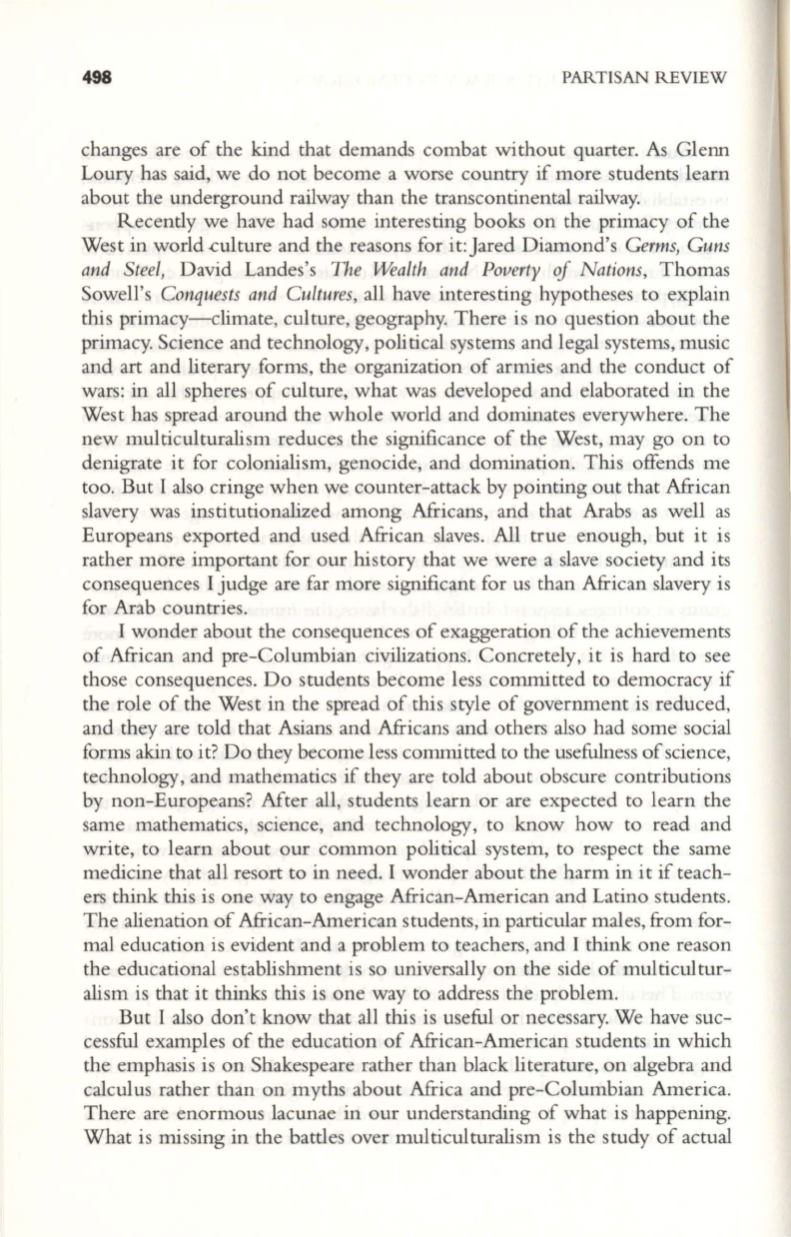
498
PARTISAN REVIEW
changes are of the kind that demands combat without quarter. As Glenn
Loury has said, we do not become a worse country
if
more students learn
about the underground railway than the transcontinental railway.
Recently we have had some interesting books on the primacy of the
West in world <:ulture and the reasons for it: Jared Diamond's
Germs, Guns
and Steel,
David Landes's
The Wealth and Poverty
if
Nations,
Thomas
Sowell's
Conquests and Cultures,
all have interesting hypotheses to explain
this primacy-climate, culture, geography. There is no question about the
primacy. Science and technology, political systems and legal systems, music
anq art and literary forms, the organization of armies and the conduct of
wars: in all spheres of culture, what was developed and elaborated in the
West has spread around the whole world and dominates everywhere. The
new multiculturalism reduces the significance of the West, may go on to
denigrate it for colonialism, genocide, and domination. This offends me
too. But I also cringe when we counter-attack by pointing out that African
slavery was institutionalized among Mricans, and that Arabs as well as
Europeans exported and used African slaves. All true enough, but it is
rather more important for our history that we were a slave society and its
consequences I judge are far more significant for us than Mrican slavery is
for Arab countries.
I wonder about the consequences of exaggeration of the achievements
of African and pre-Columbian civilizations. Concretely, it is hard to see
those consequences. Do students become less committed to democracy
if
the role of the West in the spread of this style of government is reduced,
and they are told that Asians and Africans and others also had some social
forms akin to it? Do they become less committed to the usefulness of science,
technology, and mathematics if they are told about obscure contributions
by non-Europeans? Mter all, students learn or are expected to learn the
same mathematics, science, and technology, to know how to read and
write, to learn about our common political system, to respect the same
medicine that all resort to in need. I wonder about the harm in it
if
teach–
ers think this is one way to engage African-American and Latino students.
The alienation of African-American students, in particular males, from for–
mal education is evident and a problem to teachers, and I think one reason
the educational establishment is so universally on the side of multicultur–
alism is that it thinks this is one way to address the problem.
But I also don't know that all this is useful or necessary. We have suc–
cessful examples of the education of Mrican-American students in which
the emphasis is on Shakespeare rather than black li terature, on algebra and
calculus rather than on myths about Africa and pre-Columbian America.
There are enormous lacunae in our understanding of what is happening.
What is missing in the battles over multiculturalism is the study of actual


